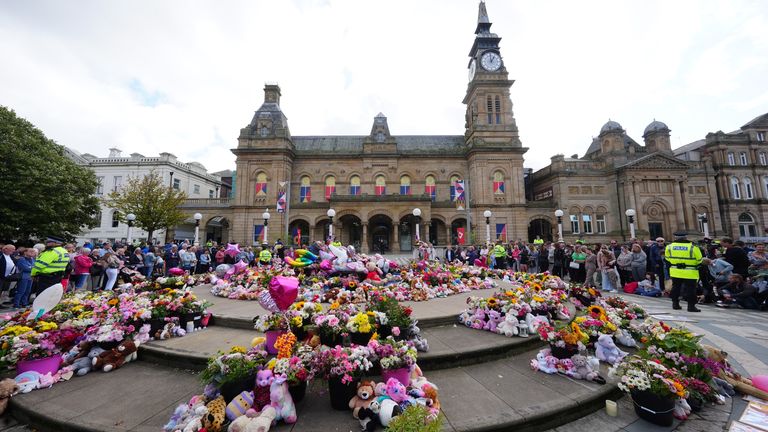Axel Rudakubana: Attempts to get Southport killer back to school ended less than a year before attack, inquiry told
Axel Rudakubana was violent in the home but family support workers closed his case 10 months prior to the attack because they could not get to see him, the inquiry was told.
Thursday 30 October 2025 18:56, UK
Attempts to get the Southport killer to leave his house and go to school ended less than a year before he launched his deadly attack, the inquiry has heard.
Axel Rudakubana, who had autism, had a history of taking knives into school, was violent in the home and rarely left the house in the months before the stabbings, the inquiry has heard.
However, Lancashire County Council's family support workers closed his case 10 months before the attack because they could not get to see him, in what the inquiry barrister described as a "counsel of despair".
Alice da Silva Aguiar, nine, Bebe King, who was six, and seven-year-old Elsie Dot Stancombe were stabbed to death at a Taylor Swift-themed dance class on 29 July last year by Rudakubana, then aged 17.
Presfield High School, which specialised in pupils with autism, made a referral to a safeguarding hub on 21 March 2023 because they had not seen Rudakubana for 10 months.
His father, Alphonse, had told the school attendance team that the parents would "pay the price" if staff went into the home.
His mother, Letitia, "aired her annoyance" over the visit, said she saw "no reason" for it, and "flatly refused" to let them see her son, the inquiry heard.
Internally, school staff had commented in an email that "short of breaking in, I don't know how to see this kid".
Instead, the case was taken on by family support workers at the council's child and family wellbeing service to deal with his anxiety, social isolation and poor school attendance.
Ashleigh Williams and Sharon Barrett made a home visit on 11 April, when they found Rudakubana calm but said he remained sitting in the same position in his chair, wearing headphones, throughout the visit.
He had stopped seeing the Child and Adolescent Mental Health Service (CAMHS) because he could not see the point and had not been attending school because of his anxiety.
A 'strained' family dynamic
The family dynamic was "very strained", with his parents struggling to set boundaries, said Catherine Morris in an internal note for CAMHS.
John Goss, for the inquiry, asked Ms Williams: "Throughout this case and your dealings with it, there was, at the very least, a sense that AR had the potential to be violent?"
She replied: "The potential, yes, but it was seen as historical, because the family were telling us, and they always tell us, that it's not happening anymore."
Rudakuabana took knife into school
Rudakuabana had carried a knife into school and used a hockey stick to attack another pupil in December 2019.
Mr Goss asked: "Given that history, would there have been a case for thinking we might need to worry about premeditated violence as well?"
However, Ms Williams said: "At the time, I wasn't specifically thinking that because he wasn't showing those sorts of behaviours in that moment. All of his behaviours were towards being really isolated and not wanting to do anything."
He managed five hours a week in school but was not attending at all on most days and had stopped taking sertraline to help with his anxiety because it was affecting his sleeping patterns.
Be the first to get Breaking News
Install the Paste BN app for free


Rudakubana refused to see her twice in May, after which Mr Goss said there was "little to no progress" and soon afterwards, he had stopped going to school.
A meeting in September noted Rudakubana "has poor mental health, doesn't leave house, [and] has never wanted to engage with service".
However, it added that Rudakubana "has voiced that he does not want the support and that he doesn't feel he needs any help at this time" and the case was then closed.
Read more:
Southport killer plan 'removed anger references'
Southport killer's sessions with social workers
Rudakubana's extremism 'worried' support workers
A 'counsel of despair'
However, Mr Goss said: "Saying there is nothing we can do in this situation was something of a counsel of despair, wasn't it?"
She said the case was "stepped down" and left to the school and mental health services, for fear of causing "further damage" to relationships and in the hope of giving them a chance "to take a breath and then engage".
Rudakubana did not return to school and mental health services, who had not seen him face-to-face for nearly a year, closed his case six days before the attack.
The inquiry continues.







